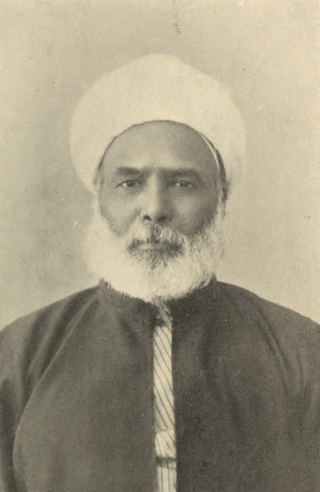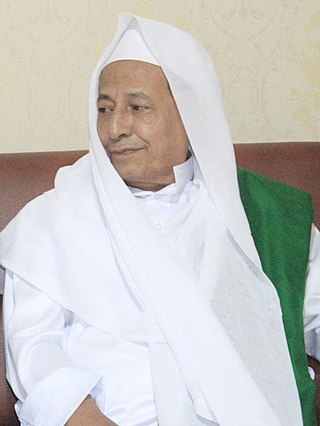Related Research Articles

Sufism, also known as Tasawwuf, is a mystic body of religious practice found within Islam which is characterized by a focus on Islamic purification, spirituality, ritualism, asceticism, and esotericism. It has been variously defined as "Islamic mysticism", "the mystical expression of Islamic faith", "the inward dimension of Islam", "the phenomenon of mysticism within Islam", the "main manifestation and the most important and central crystallization" of mystical practice in Islam, and "the interiorization and intensification of Islamic faith and practice".

The Deobandi movement or Deobandism is a revivalist movement within Sunni Islam that adheres to the Hanafi school of law. It formed in the late 19th century around the Darul Uloom Madrassa in Deoband, India, from which the name derives, by Muhammad Qasim Nanautavi, Rashid Ahmad Gangohi, and several others, after the Indian Rebellion of 1857–58. They opposed influence of non-Muslim cultures on the Muslim of South Asia. The movement pioneered education in religious sciences through the Dars-i-Nizami associated with the Lucknow-based ulama of Firangi Mahal with the goal of preserving traditional Islamic teachings from the influx of modernist, secular ideas during British colonial rule. The Deobandi movement's Indian clerical wing, Jamiat Ulema-e-Hind, was founded in 1919 and played a major role in the Indian independence movement through its participation in the Pan-Islamist Khilafat movement and propagation of the doctrine of composite nationalism.

A tariqa is a school or religious order of Sufism, or specifically a concept for the mystical teaching and spiritual practices of such an order with the aim of seeking haqiqa, which translates as "ultimate truth".

Fakir, faqeer, or faqīr, derived from faqr, is an Islamic term traditionally used for Sufi Muslim ascetics who renounce their worldly possessions and dedicate their lives to the worship of God. They do not necessarily renounce all relationships, or take vows of poverty, but the adornments of the temporal worldly life are kept in perspective. The connotations of poverty associated with the term relate to their spiritual neediness, not necessarily their physical neediness.

The Muslim Council of Britain (MCB) is an umbrella body of Muslim organisations in the United Kingdom, with over 500 affiliated mosques and organisations. It was formed in 1994 in response to British government's expressed wish for a single representative body of Muslims it could talk to. It has been called the best known and most powerful of the Muslim organisations founded since 1990. But its claims of being representative of British Muslims have been questioned. Since 2009, successive British governments have maintained a policy of "non-engagement" with the Muslim Council of Britain based on claims that the group is not sufficiently representative and that its officials have made favourable remarks about extremists in the past.

Muḥammad ʿAbduh was an Egyptian Islamic scholar, judge, and Grand Mufti of Egypt. He was a central figure of the Arab Nahḍa and Islamic Modernism in the late 19th and early 20th centuries.

The Malāmatiyya (ملامتية) or Malamatis were a Muslim mystic group active in 9th century Greater Khorasan. The root word of their name is the Arabic word malāmah (ملامة) "blame". The Malamatiyya believed in the value of self-blame, that piety should be a private matter and that being held in good esteem would lead to worldly attachment. They concealed their knowledge and made sure their faults would be known, reminding them of their imperfection. The Malamati is one for whom the doctrine of "spiritual states" is fraught with subtle deceptions of the most despicable kind; he despises personal piety, not because he is focused on the perceptions or reactions of people, but as a consistent involuntary witness of his own "pious hypocrisy".

Sufism is the mystical branch of Islam in which Muslims seek divine love and truth through direct personal experience of God. This mystic tradition within Islam developed in several stages of growth, emerging first in the form of early asceticism, based on the teachings of Hasan al-Basri, before entering the second stage of more classical mysticism of divine love, as promoted by al-Ghazali and Attar of Nishapur, and finally emerging in the institutionalized form of today's network of fraternal Sufi orders, based on Sufis such as Rumi and Yunus Emre. At its core, however, Sufism remains an individual mystic experience, and a Sufi can be characterized as one who seeks the annihilation of the ego in God.

Sufi philosophy includes the schools of thought unique to Sufism, the mystical tradition within Islam, also termed as Tasawwuf or Faqr according to its adherents. Sufism and its philosophical tradition may be associated with both Sunni and Shia branches of Islam. It has been suggested that Sufi thought emerged from the Middle East in the eighth century CE, but adherents are now found around the world.

Tazkiyah is an Arabic-Islamic term alluding to tazkiyat al-nafs, meaning 'sanctification' or 'purification of the self'. This refers to the process of transforming the nafs from its state of self-centrality through various spiritual stages towards the level of purity and submission to the will of God. Its basis is in learning the shariah and deeds from the known authentic sunnah and applying these to one's own life, resulting in spiritual awareness of God. Tazkiyah is considered the highest level of ihsan, one of the three dimensions of Islam. The person who purifies themself is called a zaki.

Sufi literature consists of works in various languages that express and advocate the ideas of Sufism.
Inayat Bunglawala was media secretary of the Muslim Council of Britain until 2010.

Kashmiriyat is the centuries-old indigenous tradition of communal harmony and religious syncretism in the Kashmir Valley in Indian-administered Kashmir. Emerging around the 16th century, it is characterised by religious and cultural harmony, patriotism and pride for their mountainous homeland of Kashmir.

A ribāṭ is an Arabic term, initially designating a small fortification built along a frontier during the first years of the Muslim conquest of the Maghreb to house military volunteers, called murabitun, and shortly after they also appeared along the Byzantine frontier, where they attracted converts from Greater Khorasan, an area that would become known as al-ʻAwāṣim in the ninth century CE.

Sufism has a history in India evolving for over 1,000 years. The presence of Sufism has been a leading entity increasing the reaches of Islam throughout South Asia. Following the entrance of Islam in the early 8th century, Sufi mystic traditions became more visible during the 10th and 11th centuries of the Delhi Sultanate and after it to the rest of India. A conglomeration of four chronologically separate dynasties, the early Delhi Sultanate consisted of rulers from Turkic and Afghan lands. This Persian influence flooded South Asia with Islam, Sufi thought, syncretic values, literature, education, and entertainment that has created an enduring impact on the presence of Islam in India today. Sufi preachers, merchants and missionaries also settled in coastal Gujarat through maritime voyages and trade.

Since the classical era, two major scholarly factions have been influential within Islamic societies: Sufism-Ash'arism-Maturidi and Salafism-Atharism. The dispute between these two schools of thought dominated the Sunni world, splitting their influence across religious communities and cultures, with each school competing for scholarly authority via official and unofficial religious institutions. The relationship between Salafism and Sufism – two movements of Islam with different interpretations of Islam – is historically diverse and reflects some of the changes and conflicts in the Muslim world today.

Sufism known as Tasawwuf in the Arabic-speaking world, is a form of Islamic mysticism that emphasizes introspection and spiritual closeness with God. It is a mystical form of Islam, a school of practice that emphasizes the inward search for The God and shuns materialism. About 60% Muslims in Pakistan regard themselves as followers of Sufi saints.

Persecution of Sufis over the course of centuries has included acts of religious discrimination, persecution, and violence both by Sunni and Shia Muslims, such as destruction of Sufi shrines, tombs and mosques, suppression of Sufi orders, murder, and terrorism against adherents of Sufism in a number of Muslim-majority countries. The Republic of Turkey banned all Sufi orders and abolished their institutions in 1925, after Sufis opposed the new secular order. The Islamic Republic of Iran has harassed Sufis, reportedly for their lack of support for the government doctrine of "governance of the jurist".

Maulana Al-Habib Muhammad Luthfi bin Ali bin Yahya, colloquially known as Habib Luthfi, is an Arab Indonesian Islamic sheikh, kyai and preacher from Pekalongan, Central Java, who has served as a member of the Indonesian Presidential Advisory Council since December 2019.
Islamic neo-traditionalism is a contemporary strand of Sunni Islam that emphasizes adherence to the four principal Sunni schools of law (madhahib), belief in one of the Ash'ari, Maturidi and Athari schools of theology and the practice of tasawwuf (Sufism), which is the classical Sunni tradition.
References
- ↑ "From another shore - New Sufis for New Labour". 25 August 2006. Retrieved 2006-10-03.
- ↑ King, Oliver (2006-07-19). "Criticism for new Muslim organisation". The Guardian. ISSN 0261-3077 . Retrieved 2023-11-21.
- ↑ Lings, Martin (1999) [1975]. What is Sufism?. Bartlow, Cambridge, UK: The Islamic Texts Society. p. 15. ISBN 0-946621-41-1.
- ↑ "Growing popularity of Sufism in Iran". April 25, 2006 – via news.bbc.co.uk.
- ↑ BBC Team (2004-04-13). "BBC - Religion & Ethics - Sufism". BBC Religion & Ethics. BBC . Retrieved 2006-10-03.
- 1 2 "Criticism for new Muslim organisation". the Guardian. July 19, 2006.
- ↑ "Sufi Politics in Britain: the Sufi Muslim Council and the 'silent majority' of Muslims | Lund University". www.lunduniversity.lu.se. Retrieved 2023-11-21.
- ↑ Casciani, Dominic (2006-07-19). "Minister backs new Muslim group". BBC . Retrieved 2006-10-03.
- About us, Sufí Muslim Council
- Minister backs new Muslim group, BB